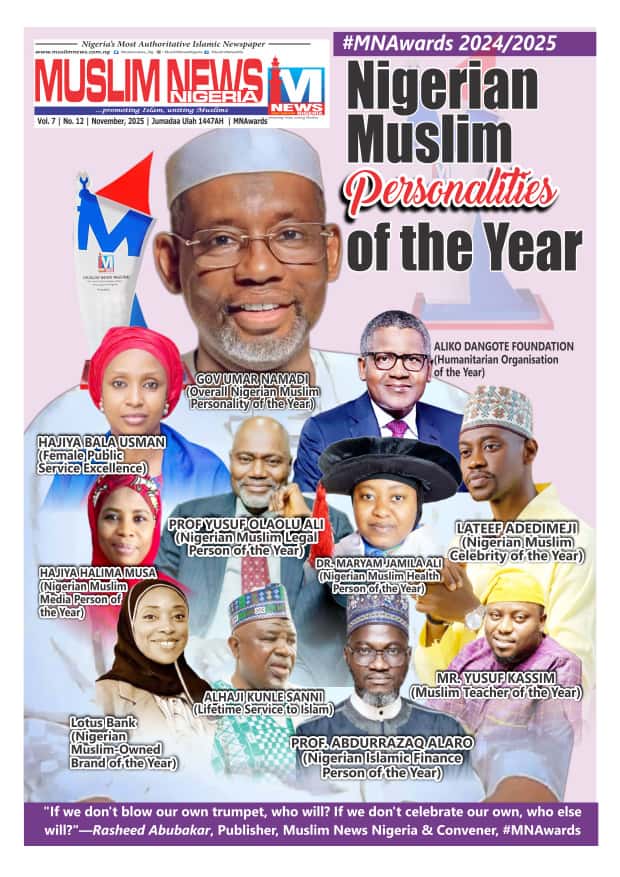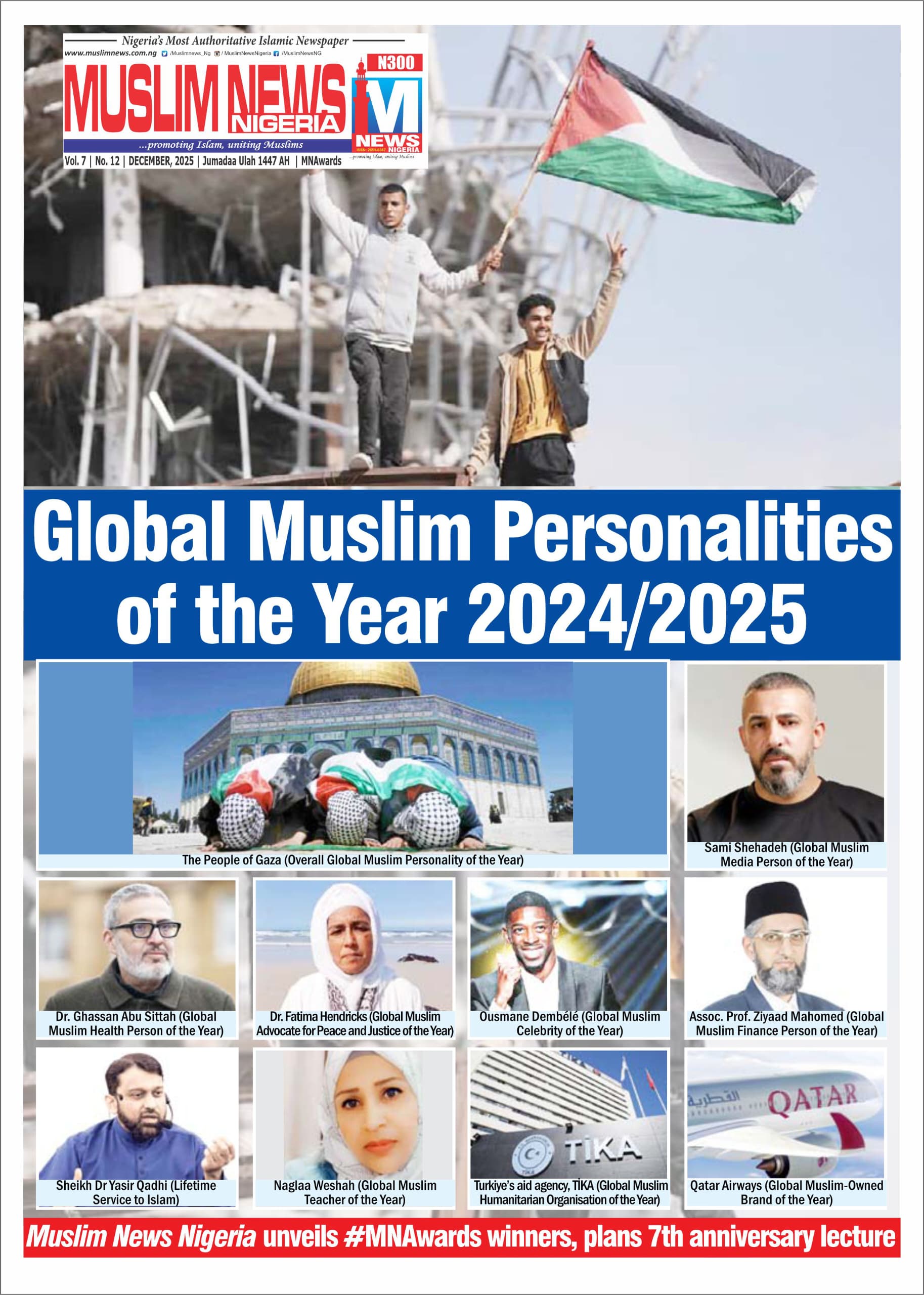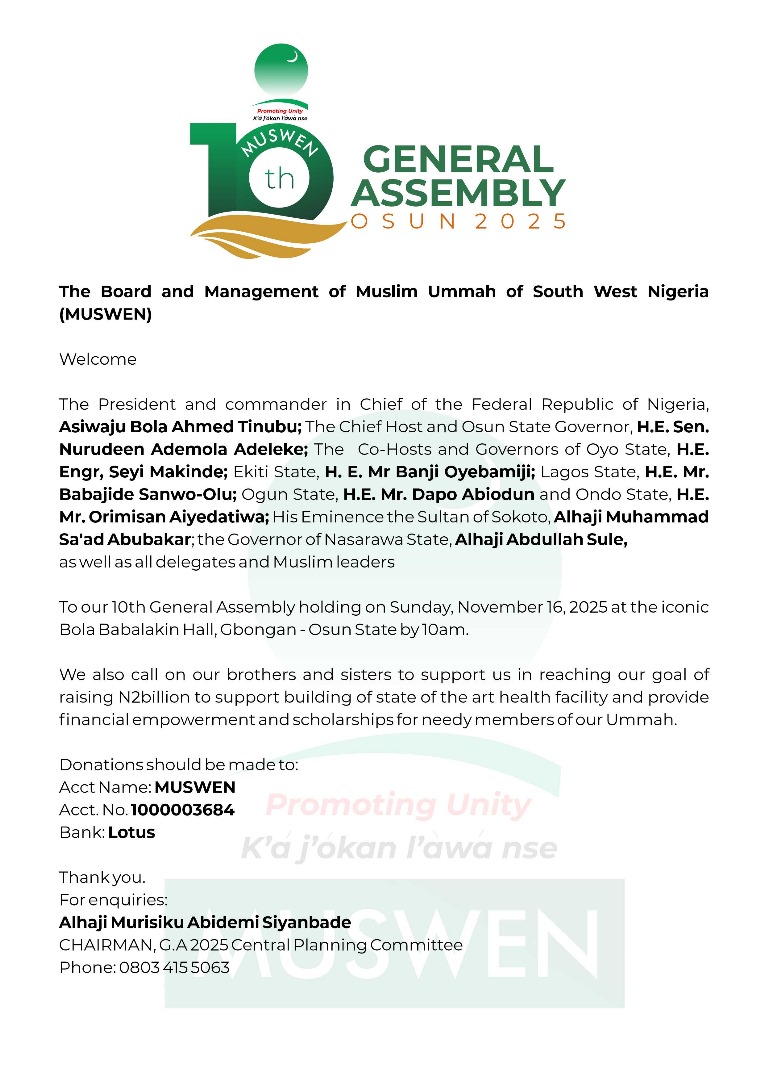By Lateef Sanni and Zulaykha Abodunrin
The Eko Convention Centre of Eko Hotel and Suites, Victoria Island, Lagos testified to the strength and resilience of Muslims in Nigeria as it hosted the 2024 Lagos 1Ummah Peace and Unity Convention, yesterday, Saturday 16th November and brought together individuals from diverse backgrounds, particularly the youth, to foster a sense of unity and shared purpose.
The event transcended organisational and ideological differences, creating a platform where participants could engage meaningfully for the sake of Allah and the progress of the Ummah.
Muslim News gathered that the initiative aimed to reinforce the foundational values of Islam— peace, cooperation, and mutual respect — by encouraging collective action for communal benefit.
At the heart of the convention was the theme “Resilience and Recovery: The Role of Faith and Reliance in Navigating Crisis,” a critical need in times like this marked by tough living and economic conditions with speakers from both the local and international communities serving as guides in the conversation.
Attendees engaged in various activities, from insightful lectures to interactive workshops, all designed to strengthen bonds within the community. By prioritizing shared Islamic values over individual or group interests, the convention highlighted the importance of solidarity in achieving common goals. The event served as a reminder of the Quranic injunction to hold firmly to the rope of Allah and not be divided.

The presence of youths at the convention was particularly significant. As the torchbearers of the future, their involvement underscored the importance of equipping the next generation with the tools needed for leadership and community building. Through networking opportunities and collaborative sessions, the youths were inspired to harness their potential for the betterment of society. The emphasis on inclusivity ensured that everyone, regardless of their organisational affiliations, felt valued and empowered to contribute meaningfully.
“Even the Angels Questioned: Reflections on Pain & Suffering in Light of the Gaza Genocide”
In an emotionally charged lecture titled “Understanding and Responding to Global Injustice: Lessons from Gaza,” the lead speaker at the Convention, Sheikh Dr. Yasir Qadhi addressed a gathering of Muslims, grappling with one of life’s most harrowing questions: Why does Allah allow immense suffering, particularly the unspeakable atrocities facing Muslims today, most vividly in Gaza?
Dr. Qadhi, a Pakistani American Muslim scholar began with an acknowledgment of the overwhelming grief and distress pervading the global Muslim community. “This is a truly distressing period,” he declared.
He recounted the recent spate of brutal killings and violence inflicted upon Muslims in different regions but especially emphasised the current genocide in Gaza. “It’s normal to ask why Allah is allowing this to happen. It is natural for us to feel confused and heartbroken,” he expressed. These sentiments, he explained, are not signs of weak faith but rather of deep empathy and the weight of human compassion.

To frame his discussion, Dr. Qadhi delved into a story from the Qur’an that sheds light on human suffering and divine wisdom. He reminded the audience of the moment when even the angels questioned Allah’s decision to create humanity. The angels asked, “Will You place upon it those who will cause corruption therein and shed blood, while we declare Your praise and sanctify You?” Allah’s response was profound and enigmatic: “Indeed, I know that which you do not know” (Qur’an 2:30).
This pivotal moment, Dr. Qadhi explained, should remind believers of the limits of human understanding. “Even the angels questioned,” he reiterated, “yet they were humbled by Allah’s wisdom.” He called on Muslims to approach these difficult events through what he described as a “paradigm of humility.”
By acknowledging that Allah’s knowledge and wisdom transcend our own, the respected Muslim scholar urged Muslims to find peace even in the midst of chaos. “When we look at suffering through the lens of humility,” he said, “we start to understand that our perspective is limited, and Allah’s is infinite,” he noted.
Dr. Qadhi then urged his listeners to seek the wisdom behind pain and suffering, emphasising that this pursuit must be coupled with a deepening of spiritual practice. “The purpose of life is to be tested.”
He explained that every trial, no matter how excruciating, is an opportunity for believers to enhance their spirituality, strengthen their relationship with Allah, and engage in more sincere acts of worship.

Yet, Dr. Qadhi emphasized that understanding divine wisdom does not mean numbing ourselves to the horrors of injustice. “We should never let our hearts grow accustomed to the suffering of our brothers and sisters,” he stressed, while encouraging the audience to actively cultivate compassion and empathy.
“Feel their pain. Let it move you to act.” He reminded everyone that even though the physical distance from Gaza may be vast, the bonds of the Ummah—of faith and brotherhood—make their suffering our collective pain.
Action, he explained, is not just an emotional reaction but a moral duty. Dr. Qadhi outlined practical ways to respond to this crisis. “Raise awareness,” he urged, “donate to trusted relief organizations, use your platforms to speak up for the voiceless, and never underestimate the power of dua.” Every resource, no matter how small, is an opportunity to alleviate the suffering of those in dire need.
The lecture closed with a collective call for self-reflection. “Do not let this tragedy pass without making you a better Muslim,” Dr. Qadhi said. “Use this period of pain to heighten your spirituality, to turn to Allah more sincerely, and to become a person who contributes to alleviating the world’s suffering in whatever capacity you can.”
With these words, Shaykh Dr. Yasir Qadhi left the audience with a renewed sense of purpose. In a time when the Ummah mourns deeply, he reminded believers that while the answers to pain and suffering are complex and often hidden, the call to act with empathy, sincerity, and humility is unmistakable. Even the angels questioned, yet they submitted, knowing that Allah’s wisdom far exceeds human comprehension. So too must we, in our trials, find solace in the One who knows what we do not.

Reclaim, embrace your true identities in this world, Sheikh Al-Shukry tells Muslims
Sheikh Amar Al-Shukry, Director of AlMaghrib Institute, who was also a Guest Speaker at the #PUV2024 in Lagos charged Muslims to reclaim and embrace their true identities in a world that is relentlessly pushing them to conform to something unnatural.
In his lecture, “Maintaining Muslim Identity and Inclusivity in a Fragmented Global Community.” he urged Muslims to remain true to their identity, “We live in a world that works relentlessly to shape people into what they are not,” he began, “into what is not natural for them to be.”
Sheikh Amar stressed that this moment in history is pivotal for Muslims to reconnect with their roots. He called for an intentional and proactive approach to learning both cultural and Islamic history, urging parents and young adults alike to become well-acquainted with where they come from.

“To know our history is to know ourselves,” he explained, adding “It’s a source of confidence and belonging, a foundation that can’t be shaken easily.” He urged the audience to take advantage of the presence of their elders while they are still alive. “Ask your parents and grandparents about your lineage,” he advised. “Have them tell you the stories of your ancestors, of the places they came from, and of the sacrifices they made. It is through these stories that our identity is kept alive and passed down to the next generation.”
Elaborating on the importance of preserving identity, Sheikh Amar outlined three foundational pillars: worldview, history, and language. These pillars, he explained, are essential to maintaining a strong and authentic sense of self in a fractured world. The first pillar provides guidance on how Muslims should engage with the world and make moral decisions.
He highlighted that holding firm to an Islamic worldview equips believers with clarity and strength, even when societal norms deviate from their values. “It’s about understanding our purpose, recognizing that we are not just here to exist but to live in accordance with the teachings of our Creator,” he emphasized.

The second pillar, history, ties individuals to a legacy that is both inspiring and instructive. Ustadh Ammaar emphasized that knowing our history fosters a deep appreciation for the struggles and triumphs of past generations. This knowledge serves as a reminder that Muslims have always been part of a global ummah, connected by faith and tradition. “Understanding where we come from helps us navigate where we are going,” he said.
The third pillar, Sheikh Amar described as the key to unlocking the beauty and depth of past teachings. “Language gives access to the treasures of our culture and religion,” he stated. “When you learn Arabic, for example, you can read the Qur’an in its original form, experiencing the full power and eloquence of Allah’s words.” He also spoke of the importance of preserving one’s mother tongue, as it connects individuals to their cultural heritage and strengthens familial bonds.
Ustadh Amar Al-Shukry’s message was clear: in a fragmented global community, maintaining a strong Muslim identity requires conscious effort. By understanding our worldview, appreciating our history, and valuing our language, we can remain true to ourselves and inclusive of others, while confidently navigating the world around us.










